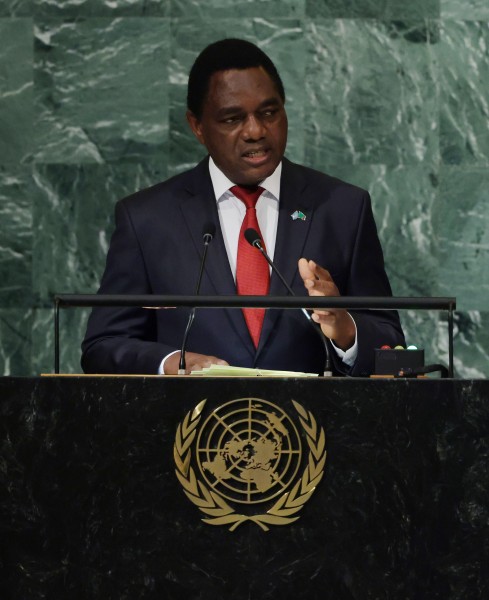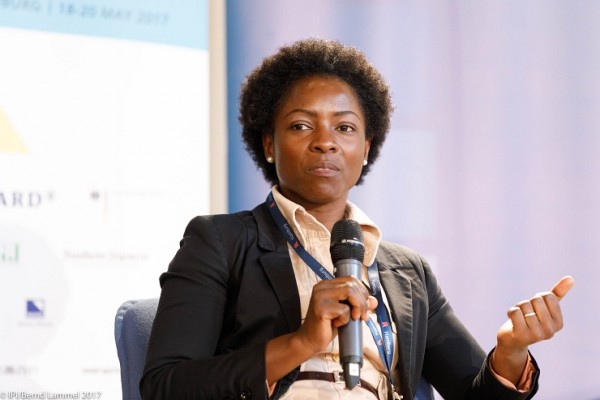On Monday 18 October, IPI sent a letter to Zambian Vice President George Kunda requesting that his government refrain from statutory regulation of the media in the southern African country. Copies of the letter were also hand-delivered to President Rupiah Banda and Information Minister Ronnie Shikapwasha, with whom an IPI delegation met twice during a press freedom mission to Zambia last week.
An IPI delegation was in Lusaka from 11 to 17 October 2010, to meet with members of the media, journalist organizations and government officials to discuss press freedom and the media landscape.
During its visit, IPI learned that following protracted discussions with the media in Zambia, the government is now insisting on statutory regulation of the media there – despite the fact that the media answered government calls for regulation by setting up a new, voluntary self-regulatory mechanism that includes all major private and public media.
IPI has not yet received a response to the letter. Spokespersons from the offices of Vice President Kunda and President Rupiah Banda say that the officials are travelling and will not return to their offices until next week. A spokesperson from the Information Ministry was not able to confirm receipt of the letter, but IPI has sent a second copy and looks forward to hearing the minister’s response next week.
To read IPI’s statement that was issued during a press conference in Lusaka, Zambia on 15 October, click here.
The full text of the letter to Vice President Kunda is below:
Honourable Vice President George Kunda
Vice President’s Office/ Ministry of Justice
Zambia
Tel: 00260317/26
Fax: 00260254545
Honourable Vice President Kunda,
It is with great concern that I write to you about the ongoing issue of media regulation in Zambia.
The International Press Institute, the world’s oldest press freedom organization comprised of members from 111 countries, is discouraged by the government’s position on media regulation and its stance that it will move to regulate the media by statute in the coming months.
During our time here in Zambia, we have met twice with Minister of Information and Broadcasting Services, the Honourable Rev. Lt. Gen. Ronnie Shikapwasha, who, while expressing a desire to work with the Zambia Media Council on its proposed self-regulatory guidelines, continues to insist that joining the council be mandatory and that the government have oversight over the Council.
As expressed to the honourable minister, we join the members of the Zambia media in strong opposition to statutory regulation of the media. Our opposition is based on a number of major concerns:
– Media should not come under the regulation of government bodies who can, and often do, impose severe fines and even jail time for what the government or a government official deems as an offense to him or herself, or to an affiliated business or political institution.
– Like all other Zambian citizens, journalists are already regulated by laws in Zambia that deal with defamation, libel and sedition.
– Of the 87 press councils in the world, 86 percent (around 74) are voluntary and self regulating, according to a 2007 survey by the New Zealand Press Council – demonstrating the effectiveness of this system
– Voluntary self-regulation works, because the most powerful coercive force to a media house or journalist is the opinion of other media and other journalists. Repeated sanctions or reprimands from a press council cause painful and lasting damage to a journalist or media house’s reputation-and eventually to its bottom line.
Honourable Minister, choosing to regulate the media by statute would be a major blow not just for media in your country, but for media throughout the region and, we would argue, throughout the world.
We implore you to reconsider the government’s position, particularly as a major media stakeholder. Government employs more journalists than any other company in Zambia – many of whom have openly and repeatedly expressed their support for voluntary self-regulation.
The media fraternity has, through amendments to the ZAMEC constitution following concerns from the minister on a number of issues, demonstrated its willingness to compromise and ensure that the council will be impartial, inclusive and effective.
A free press is a cornerstone of democracy, because it is the role of the press to speak the voice of the people and ensure transparency and therefore development. IPI believes that if the Zambian government refrains from statutory regulation and allows public media to participate in the voluntary body, the benefits will ripple outwards – not just to public and private media, but to the people of Zambia.
We encourage you to call a summit of leaders in the next few weeks from the Media Liaison Committee, the Society of Senior Zambian Journalists and independent media observers to come up with a concrete and acceptable compromise as a way forward.
Thank you for your urgent attention to this matter. If you have any further questions on any of the points raised above, please feel free to contact me at any time.
Faithfully yours,
Alison Bethel McKenzie
Head of IPI Delegation to Zambia
Acting Director of IPI
CC’d:
President Rupiah Banda
State House
P.O. Box 30135
Lt. Gen. Ronnie Shikapwasha
Minister for Information and Broadcasting Services
Government Complex
Independence Avenue
6th Floor
P.O. Box 51025


